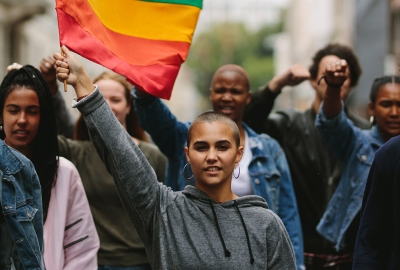
Intersectional Racial Justice captures the connection among movements for trans lives, LGBTQIA+ rights, feminism, womanism, dis/ability, environmental justice, food justice, faith, Indigenous peoples’ and Native rights, immigration justice, and more. It sits in the context of social justice, focusing on how social identities do not exist in isolation but overlap across race, class, gender, sexuality, religion, ability, citizenship, nationality, and age, etc. This complex system of overlapping identities allows us to recognize how oppression and/or privilege work together and are deeply intertwined. It also allows us to work from a place of empowerment and solidarity instead of guilt, fear, or divisiveness.
What does intersectional racial justice look like?
Acknowledging and correcting disparities in education access and career advancement for marginalized BIPOC womxn and gender expansive people at all intersections of their identities at NYU Steinhardt.

Resources
Racial Justice Advocate and NYU Alum on What Keeps Him Hopeful About the Future
Media, Culture, and Communication alum Janerick Holmes (BS '11) is buoyed by the resilient and passionate fellows that pass through the Racial Justice Institute, where he serves as Associate Director.
Statement Affirming the Pursuit of Racial and Social Justice through Education
As a school of culture, education, and human development — and as the first school of pedagogy in the western hemisphere — we at NYU Steinhardt condemn the premise upon which this Executive Order was based and the implications to which it may lead.
Keep Saying Her Name: We Still Demand Justice for Breonna Taylor
Today, we continue to support our communities and join the struggle for broad accountability, to hold those liable who enact violence against and harbor disdain for vulnerable people, especially Black womxn.


